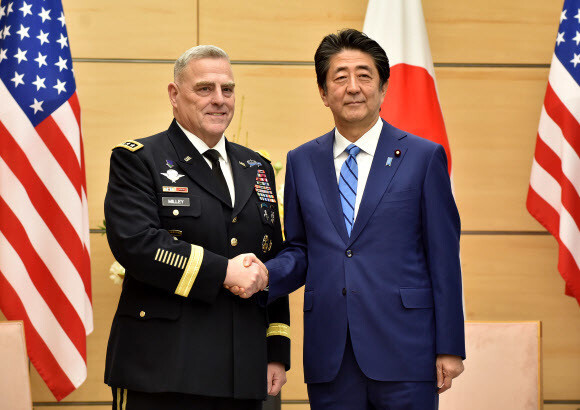hankyoreh
Links to other country sites 다른 나라 사이트 링크
US JCS chairman says Americans want to know why S. Korea “can’t defend itself”

On Nov. 11, the Pentagon quoted US Joint Chiefs of Staff Chairman Gen. Mark Milley as saying that the “average American” wants to know why countries as wealthy as South Korea and Japan can’t defend themselves. Milley’s remarks, which were reported as he was embarking on a trip to Japan and South Korea, are an attempt to use American public opinion to leverage more pressure on South Korea to increase its financial contribution to the cost of stationing US troops on the Korean Peninsula.
The US Defense Department posted an article to its website on Monday titled “Chairman Travels to Indo-Pacific; Affirms Region’s Strategic Importance” that outlines Milley’s plans to visit Japan and South Korea.
Milley arrived in Japan on Nov. 11 for a two-day stay. He is planning to visit South Korea on Nov. 13 and attend the South Korea-US Security Consultative Meeting (SCM) on Nov. 15 with US Defense Secretary Mark Esper.
While on a military aircraft bound for Japan, Milley told reporters that “the average American looking at the forward deployed US troops in South Korea and Japan ask some fundamental questions: Why are they needed there? How much does it cost? These are very rich and wealthy countries, why can’t they defend themselves?”
“These are main street USA questions. It is incumbent on us [. . .] to make sure we adequately explain how the US military is a stabilizing force in Northeast Asia in preventing and deterring the outbreak of armed conflict,” the general said.
Milley expressed his support for the continuation of South Korea and Japan’s General Security of Military Intelligence Agreement (GSOMIA), which Seoul has decided to terminate at midnight on Nov. 23. Describing GSOMIA as being “key for security and stability in the region,” Milley said, “The United States, South Korea, and Japan are stronger when we are together and shoulder to shoulder.”
“It is clearly in China’s interests and North Korea’s interests, to separate South Korea from Japan and the United States. It is in our interests to keep all three of us very closely aligned.”
By Hwang Joon-bum, Washington correspondent
Please direct comments or questions to [english@hani.co.kr]

Editorial・opinion
![[Column] Samsung’s ‘lost decade’ and Lee Jae-yong’s mismatched chopsticks [Column] Samsung’s ‘lost decade’ and Lee Jae-yong’s mismatched chopsticks](https://flexible.img.hani.co.kr/flexible/normal/500/300/imgdb/original/2024/0512/3017154788490114.jpg) [Column] Samsung’s ‘lost decade’ and Lee Jae-yong’s mismatched chopsticks
[Column] Samsung’s ‘lost decade’ and Lee Jae-yong’s mismatched chopsticks![[Correspondent’s column] The real reason the US is worried about Chinese ‘overcapacity’ [Correspondent’s column] The real reason the US is worried about Chinese ‘overcapacity’](https://flexible.img.hani.co.kr/flexible/normal/500/300/imgdb/original/2024/0510/5217153290112576.jpg) [Correspondent’s column] The real reason the US is worried about Chinese ‘overcapacity’
[Correspondent’s column] The real reason the US is worried about Chinese ‘overcapacity’- [Editorial] Yoon’s gesture at communication only highlights his reluctance to change
- [Editorial] Perilous stakes of Trump’s rhetoric around US troop pullout from Korea
- [Guest essay] Preventing Korean Peninsula from becoming front line of new cold war
- [Column] The state is back — but is it in business?
- [Column] Life on our Trisolaris
- [Editorial] Penalties for airing allegations against Korea’s first lady endanger free press
- [Editorial] Yoon must halt procurement of SM-3 interceptor missiles
- [Guest essay] Maybe Korea’s rapid population decline is an opportunity, not a crisis
Most viewed articles
- 1Seoul’s plan to adopt SM-3 missiles is like wanting a sledgehammer to catch a fly
- 2[Column] Samsung’s ‘lost decade’ and Lee Jae-yong’s mismatched chopsticks
- 3‘We must say no’: Seoul defense chief on Korean, USFK involvement in hypothetical Taiwan crisis
- 4[Correspondent’s column] The real reason the US is worried about Chinese ‘overcapacity’
- 5S. Korea “monitoring developments” after report of secret Chinese police station in Seoul
- 6Yoon voices ‘trust’ in Japanese counterpart, says alliance with US won’t change
- 7Yoon rejects calls for special counsel probes into Marine’s death, first lady in long-awaited presse
- 846% of cases of violence against women in Korea perpetrated by intimate partner, study finds
- 9N. Korean delegation’s trip to Iran shows how Pyongyang is leveraging ties with Moscow
- 10Korea poised to overtake Taiwan as world’s No. 2 chip producer by 2032